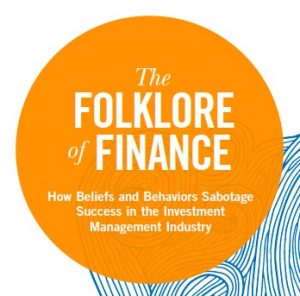Can you pass State Street’s ‘Success Sabotage’ test?
 Our own State Street right here in town is calling out investors and professionals in its just-released Folklore of Finance thought piece. Are you or your advisors guilty of sabotaging your own investment success? See if you are prey to these false folklores.
Our own State Street right here in town is calling out investors and professionals in its just-released Folklore of Finance thought piece. Are you or your advisors guilty of sabotaging your own investment success? See if you are prey to these false folklores.
Big and successful for good reason
State Street Corporation on Lincoln Street here in Boston is among the top of the industry with $2.3 trillion under management, custody of $28 trillion, and they’ve been around since 1792. They are on every investment professional’s ‘must listen to’ list. When Suzanne Duncan’s Folklore of Finance from State Street Global Advisors went live this past Monday morning it moved to the top of our ‘must read’ list. We recommend it not only as a must read, but a must act. Why?
What’s the problem?
“Just because the industry is profitable doesn’t mean it’s successful”. Advisors know that investing based on past performance and imitating their peers does not lead to success, yet the majority do just that. On the other side, investors know they are investing for their long term future but often fail to write down just what those goals mean. As a result of misdirected time and money, financial services clients often feel distrustful and dissatisfied of their money managers and brokers. Sound familiar? Based on this, investors sometimes seek disintermediation, turning to do-it-yourself rules of thumb, cheap robotic algorithm advisors, or magical investment heuristics and phrases. Or they may settle in with reduced expectations and repeated shortcomings. Is this the best I can do, you may ask yourself? Why am I so often unfavorably surprised or disappointed?
Dangerous beliefs
The flawed behaviors that undermine individual investors are often the same that derail professionals in their obsession for alpha: overconfidence in personal ability to pick winners, trusting past results as a predictor of the future, giving credibility to pundits, basing investment decisions on short-term news, and many others. Suzanne’s take is that most of these mistakes result from folklore, not facts. Funds given 5 stars are believed to be better bets than 2 star funds. Negative headlines are believed to lead to lower stock prices. Consultants are believed to be smarter than the market as a whole. These beliefs become the conventional wisdom. Folklore is given far more credence than it deserves. In essence, we all think we know more than we do. Let’s face it, the frequency with which you beat the S&P 500 cannot put your kids through college or fund your retirement. Taking on extra and unnecessary risk in hopes of beating the market may cost you dearly.
Help is available
Awareness gets you more than 50% of the way there. Here are the things you can do now to confirm you’re on the right investment track, or that you need to make a change. Suzanne mentions these as the major topics for investors and investment professionals to discuss:
- Avoid the allure of Alpha, stock picking or market timing the way to outperformance
- Do set long term investment goals and refer back to them to guide decision making
- Understand that investment success is only relative to the goals of the investor
- Avoid short-term thinking, market timing is far and above the most punishing factor investors attempt to control
- Watch for overconfidence in picking winners, reacting to news, following investment gurus or pundits, and predicting momentum
- Be aware of ‘false comfort’, the tendency to over-rely on ratings, style boxes, benchmarks, analyst reports, outlooks, etc.
- (Bonus reading) Learn the common heuristic and behavioral pitfalls that all investors are subject to (page 31 of the report)
For State Street’s quick summary, check here. For the full report, go here. Financial Folklore is everywhere, often causing you or your advisor to sabotage your own best efforts. The path to success for investors is through an efficient allocation of time, money and energy to reach long term goals.
Sabotage be gone! The moral of the story
As easy as it can be to accept folklore as truth, there is another way. Try being a tireless advocate of facts. Now that you are aware of the problem – and face it, the industry is very much at fault here – your can begin to make it better. First, sit down with your advisor and review the ‘behavioral biases’ on page 31 of the Folklore of Finance report. Next, request a cost and tax audit of your investment results. Make sure you are not paying for what you don’t get. Last, follow the money and ask your advisor how they are compensated and if that structure creates any conflicts of interest. If that review comes up short, call us. We’d be delighted to show you how you can raise your expectations.
Max Osbon – mosbon@osboncapital.com
Weekly Articles by Osbon Capital Management:
"*" indicates required fields
